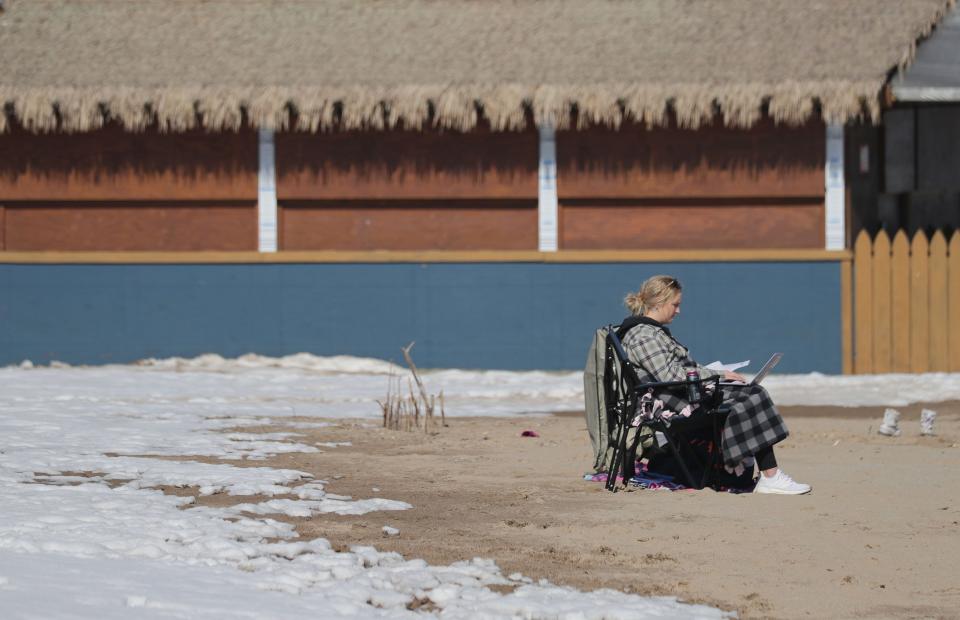This winter has largely been a series of record-setting weather events in Milwaukee
As predicted earlier this month, Milwaukee is closing out its warmest-ever winter on record.
The National Weather Service defines winter as the months of December, January and February. According to local NWS meteorologist Taylor Patterson, Milwaukee has seen an average overall temperature of 34.6 degrees over the past three months through Feb. 28.
This is two degrees warmer than the three-month average across the city's previous warmest-ever winter, which occurred in 1931-1932 and saw an average temp of 32.6 degrees.
Even with one day left in February, Patterson said there's pretty much nothing that could realistically stop 2023-2024 from setting the warmest-ever winter record.
From Milwaukee's warmest Christmas on record to Wisconsin's first and only February tornado to this week's historic 50-degree temperature swing, this winter has set plenty of weather records. Here's a look back at them.

December 2023 was Milwaukee's warmest-ever on record
December 2023 was Milwaukee's warmest December on the books, according to NWS data. The month saw an average temperature of 39.5 degrees, breaking the previous record set in December 2015, which saw an average temp of 37.7 degrees, Patterson said.
At 10.9 degrees above normal, this December was also Wisconsin's warmest last month of the year on record, according to the State Climatology Office. It was the first time the statewide average December temp was above freezing (the month's average was 32.3 degrees), and the month was only about two degrees colder than November.
On Dec. 24, Milwaukee saw its second-warmest average Christmas Eve temperature, 49 degrees, just one degree shy of the 50-degree record set in 1889, according to NWS data. This was followed by Milwaukee's warmest-ever average Christmas Day temperature, 50 degrees.
Fun fact: In 2023, Christmas in Milwaukee was warmer than Thanksgiving (46 degrees), which was warmer than Halloween (40 degrees).
This December also set a few all-time record-high low temperatures in Milwaukee ― the warmest recorded low temperature for a particular day:
Dec. 16 ― Record-high low temperature, 43 degrees
Dec. 22 ― Record-high low temperature, 43 degrees
Dec. 23 ― Record-high low temperature, 44 degrees
Dec. 24 ― Record-high low temperature, 45 degrees
Dec. 25 ― Record-high low temperature, 48 degrees

January 2024 was Wisconsin's 10th-warmest on record
Thanks to nine days of well-below-normal temperatures during mid-January's frigid cold snap, January was by far Milwaukee's coldest month during this record-setting winter. Still, it was the 20th warmest in the city's recorded history, Patterson said.
January 2024 saw an average overall temperature of 27.8 degrees in Milwaukee, she continued, while the warmest January on record occurred in 1880 with an average temp of 34.4.
While this January didn't crack the top-10 warmest for Milwaukee, it did do so in Madison and in the state as a whole. Despite the cold snap, Wisconsin saw its 10th-warmest January on record. The month was 8.5 degrees warmer, on average, than normal. The state saw its warmest-ever January in 2006; it was about 15 degrees warmer than normal, on average. This year, Madison saw its seventh-warmest January on the books, Patterson said.
In Milwaukee, two record-high low temp records were tied this January:
Jan. 24 ― Record-high low temperature, 36 degrees
Jan. 25 ― Record-high low temperature, 37 degrees

February 2024 was Milwaukee's warmest-ever on record
February has also been Milwaukee's warmest recorded. The month has been 36.9 degrees, on average, Patterson said, about one degree warmer than the previous record set in February 2017, which was 35.5 on average.
This February began as one of Milwaukee's most snowless and set a record high of 49 degrees on its first day. The month also saw Wisconsin's first-ever and only February tornado in recorded history, spun up in part due to record-breaking high temperatures.
Then, this week, after recording a February record high temperature of 74 degrees Tuesday afternoon, Milwaukee experienced a record-setting temperature drop of nearly 60 degrees; it was just 16 degrees Wednesday morning, according to an NWS X, formerly known as Twitter, post. Milwaukee will close out this record-setting month with what is very likely to be one of its warmest-ever Leap Days.
Milwaukee set numerous record high and record-high low temperatures this month:
Feb. 1 ― Record high temperature, 49 degrees
Feb. 8 ― Record high temperature, 59 degrees
Feb. 8 ― Record-high low temperature, 37 degrees
Feb. 9 ― Record high temperature, 54 degrees
Feb. 9 ― Record-high low temperature, 39 degrees
Feb. 27 ― Record high temperature, 74 degrees
Feb. 27 ― Record-high low temperature, 49 degrees

Why is it so warm this winter?
The primary culprit behind the unseasonably warm winter is a weather phenomenon known as El Ni?o.
An El Ni?o event is caused when sea surface temperatures in the central and eastern Pacific Ocean warm to above average for several months. During an El Ni?o, the polar jet stream is shifted northward, which limits how far south cold-air intrusions from Canada can travel into Wisconsin, NWS meteorologist Jaclyn Anderson told the Journal Sentinel.
In general, El Ni?o brings above-average temperatures to the northern United States, which often result in below-average snowfall in moderate-to-strong El Ni?o years. Last year, the Milwaukee-area NWS said this winter's El Ni?o was on track to be one of the strongest on record.
But what about climate change?
Climatology is the study of weather over time, Patterson said. So, when it comes to whether a singular event like this season's El Ni?o was caused by climate change, it's hard to say right away.
When studying climate change, "you look at multiple events over a year or longer," Patterson said.
So, regarding the cause of El Ni?o and this season's incredibly warm winter, "We don't really know, but it's definitely something that we'll be looking back on as we start to look at it in context to previous years and into the future going forward" when studying the climate.
More: It's been Milwaukee's warmest winter ever. Does that mean we're in for a hot spring and summer?
This article originally appeared on Milwaukee Journal Sentinel: Milwaukee's warmest winter ever includes many record-setting events
